Resources
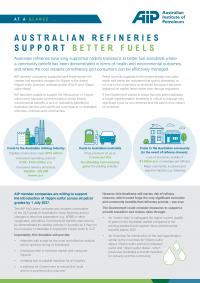
Date
Description
Australian refineries have long supported orderly transitions to better fuel standards where a community benefit has been demonstrated in terms of health and environmental outcomes, and where the cost impacts on refineries and consumers can be effectively managed.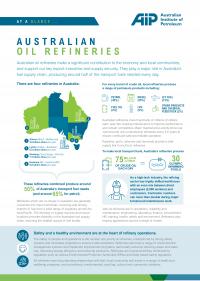
Date
Description
Australian oil refineries make a significant contribution to the economy and local communities, and support our key export industries and supply security. They play a major role in Australia’s fuel supply chain, producing around half of the transport fuels needed every day.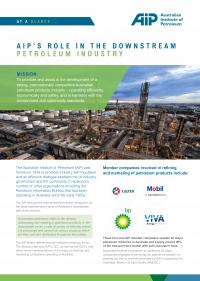
Date
Description
The Australian Institute of Petroleum (AIP) was formed in 1976 to promote industry self-regulation and an effective dialogue between the oil industry, government and the community. It replaced a number of other organisations including the Petroleum Information Bureau that had been operating in…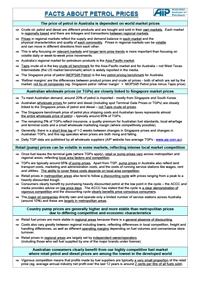
Date
Description
The price of petrol in Australia is dependent on world market prices Crude oil, petrol and diesel are bought and sold in their own markets. Each market is regionally based and there are linkages and transactions between regional markets. Prices in regional markets reflect the supply and…Date
Description
Liquid Fuel Supply Security and Reliability The Australian liquid fuel supply chain has considerable span and diversity. It includes crude and petroleum product shipments into and around Australia, refinery throughput, bulk fuel storage tanks, extensive terminal and distribution networks, over…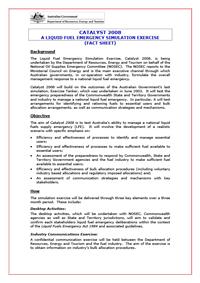
Date
Description
In 2008, the Department of Resources, Energy and Tourism (DRET), on behalf of NOSEC, undertook a Liquid Fuel Emergency Simulation Exercise – 'Catalyst 2008'. The aim of 'Catalyst 2008' was to test the emergency preparedness of the Commonwealth State and Territory Governments and industry to manage…Date
Description
AIP has produced a set of basic facts on biofuels in Australia to inform consumers, commentators and other interested parties. AIP has consistently stated that there is a sustainable role for biofuels in the Australian fuels market provided biofuels are competitively priced, have a reliable supply…Date
Description
The Australian Institute of Petroleum (AIP) in conjunction with petrol manufacturing and importing member companies have decided to remove dye from unleaded petrol and E10 (regular unleaded petrol with 10% ethanol added). This change will not have any impact on the fuel’s performance or on…Date
Description
The Australian Institute of Petroleum (AIP) advises that petrol manufacturing and importing member companies are currently in the process of changing the industry controlled standard colour (dye) of unleaded petrol (i.e. 91 Research Octane Number grade) from Purple/Bronze to Red/Orange. This colour…Date
Description
AIP welcomes the conclusions of the ACCC Pricing Inquiry, that there is no evidence of price fixing or collusion in the fuel supply industry in Australia and that petrol pricing is largely a result of international factors. The Executive Director of AIP, Dr John Tilley, said, "AIP and its member…